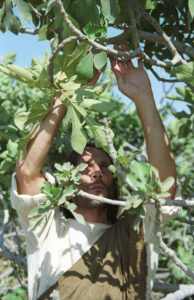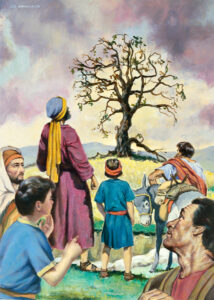Why Did Jesus Curse the Fig Tree?
 Coming from Bethany towards Jerusalem, Jesus saw a fig tree in full leaf, and approached it, hoping to find some figs. Finding none, He cursed the tree, and by the next day, it had withered and died! (See Mark 11:12-26.) What a strange story this appears to be – a contrast to the loving acts of Jesus throughout the gospels.
Coming from Bethany towards Jerusalem, Jesus saw a fig tree in full leaf, and approached it, hoping to find some figs. Finding none, He cursed the tree, and by the next day, it had withered and died! (See Mark 11:12-26.) What a strange story this appears to be – a contrast to the loving acts of Jesus throughout the gospels.
Now let’s take a closer look. First of all, it helps to understand the nature of fig trees grown in the Mediterranean area. Unlike many fig trees grown in areas of the US that experience significant winter freezing, most, if not all fig trees grown in areas such as the vicinity of Jerusalem bear a spring crop that grows on last year’s wood and starts developing before the leaves break out.Note By the time the tree is in full leaf, it is reasonable to expect ripe figs, and that’s exactly what Jesus expected, even though it was not yet the season for ripe figs, as Mark 11:13 tells us. This tree in full leaf, gave promise of an earlier crop than the rest of the trees that were not yet leafed out.
But still, why did Jesus curse the fig tree? This is the only instance in the gospels where Jesus actively “cursed” something. But why?
I believe that this was an acted parable in conjunction with his parable of the fig tree found in Luke 13:6-8. In this story parable, we see the owner of a vineyard wanting to cut down an unfruitful fig tree, but he is deterred by the keeper of the vineyard who offers to dig around it and fertilize it, “And if it bears fruit, well. But if not, after that you can cut it down.’ ” (Mark 13:9) The implication is clear – if there is no fruit the following year, the tree will be cut down.
When we consider the fig tree in full leaf contrasted with the other fig trees not yet leafed out, we can see a picture of the nation of Israel at the time of Christ. They professed to be God’s people, and it was reasonable to expect good “fruit” in their lives – fruit of goodness, righteousness and truth. (cf. Eph. 5:9). By contrast, the other trees did not raise such expectations, because they were not in full leaf – just like the Gentiles did not raise the expectation of demonstrating the fruit of the Spirit of God. God expects fruit in accordance with our profession and our privilege. (See also Luke 12:47-48)
In this instance of cursing the fig tree, and a number of parables, Jesus made clear that the judgment of God will fall on those professing to be God’s people while they do not demonstrate the fruit of the Spirit in their lives. (See particularly the parable of the sheep and the goats in Matthew 25:31-36.) God is a God of justice as well as mercy.
The lesson is for us as well. Do we bear the fruit of the Spirit (Galatians 5:22, Ephesians 5:9), or do we only have the appearance of fruit?
Jesus has promised to give His Spirit in full measure to all who ask in sincerity. (See Luke 11:11- 13) And the Holy Spirit will produce fruit in our lives – the fruit of love, joy, peace, longsuffering, kindness, goodness, righteousness, truth, faithfulness, gentleness, self-control. But we need to ask!
You may also read about this in more detail in The Desire of Ages, page 581 and Christ’s Object Lessons, page 214.
Note: In the US, we call the spring crop a “breba” crop, and only certain varieties of figs have it. We planted a fig tree that was supposed to bear a breba crop, but that crop is not reliable in our area. Our fig tree is about to be cut down, because we seldom get a few figs in the summer, and the fall crop comes too late. It was when I realized that Jesus was looking for this early crop that the incident of the cursed fig tree started making sense to me.

